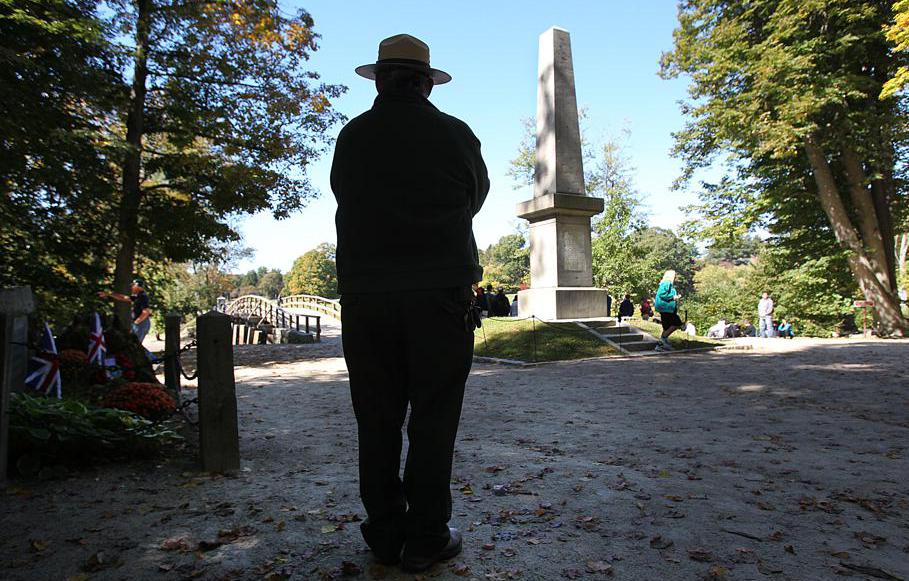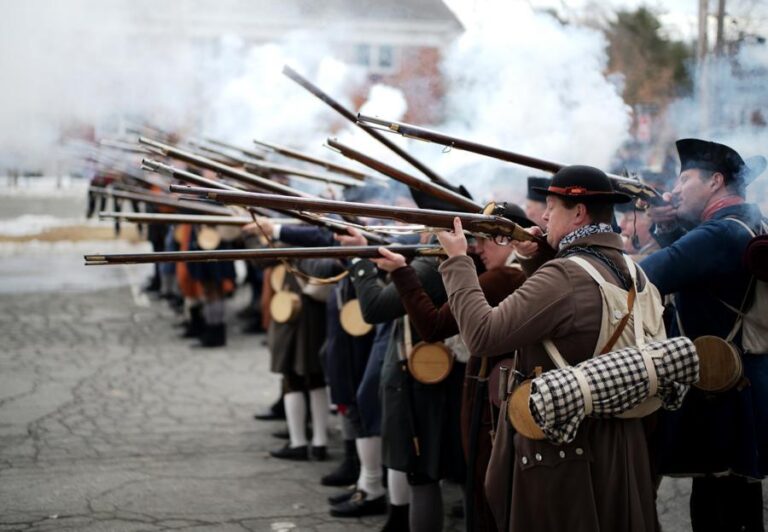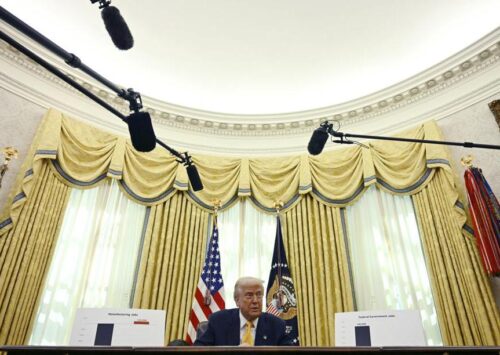
LEXINGTON — On April 19, 1775, the Revolutionary War began. On April 20, 1775, Concord and Lexington began fighting over where exactly that war began.
Now, with the 250th anniversary approaching, shots are flying again in this long-running dispute over who deserves credit as the birthplace of the war that ultimately led to the establishment of the United States of America.
It’s a long saga, and includes a contentious stretch in the 19th century centered around a Concord monument and a poem by Ralph Waldo Emerson, which we’ll get into in a moment. But it restarted in earnest a few weeks ago, when Concord250, the organization overseeing the anniversary events for the town, sent out a release inviting the media to Concord to commemorate “when the first shots of the American Revolution were fired at Concord’s Old North Bridge.’’
That’s simply not true, said Robert Allison, a history professor at Suffolk University.
“The first shots were fired in Lexington. For historians, this matter is not in dispute,’’ said Allison, who is also the president of the Colonial Society of Massachusetts. “I don’t know what Concord is up to other than to try to claim they’re the center of the universe.’’
That’s the kind of statement that will get you a free beer in Lexington, where the rivalry between the two towns runs deep — they play each other in football on Thanksgiving — and will continue this April 19 with huge competing gala celebrations, Concord250 and Lex250.
To understand this two-century-long disagreement, let’s look at the facts that are not in dispute. Late on April 18, 1775, with revolutionary tensions simmering in the Colonies, about 700 British troops left Boston on a mission to destroy cannon and other military supplies they believed to be stored in Concord.
As the sun was rising on April 19, the Redcoats arrived in Lexington, the last town before Concord, where they were met on the town green by 77 Lexington militiamen, who had mustered after Paul Revere and other riders warned them that the British were coming. Shots were fired. Eight Lexington men were killed and 10 others wounded, while the rest retreated.
The British then continued to Concord, where hundreds of militiamen from several towns gathered on a hillside and watched their movements. The British found cannon carriages and lit them on fire, and when the militia saw the smoke, they worried the British were burning the town down, and advanced on British troops that were guarding North Bridge on the Concord River.
The British fired. The militia fired back. Both sides took casualties. And the bloodshed continued for the rest of the day as the British troops fought their way back down the road to Boston, 16 miles under near-constant barrage from thousands of Colonial militia who were joining the fight from all over.
There was no question that the war had begun. But as the years passed and conflicting accounts were recorded, a dispute arose over whether the Lexington militiamen had fired back in that initial confrontation. And if they hadn’t, could they take credit for starting the war?
“The entire argument centers around the phrase ‘first forceable resistance,’’’ said David Wood, the longtime curator of the Concord Museum. “That argument started in the 1800s, and it’s still argued over.’’
In 1836, to commemorate the 50th anniversary of American independence, Concord erected a large monument at the North Bridge and on it inscribed the phrase: “Here on the 19 of April 1775 was made the first forcible resistance to British aggression,’’ a wording first used by a Concord politician named Samuel Hoar a decade before.
Citing historical records, Concord made the argument that the Lexington militia was not ordered to fire back. Lexington refuted this, rushing to get affidavits from the surviving members of the Lexington militia, stating that they did indeed fire back. There were hostile newspaper articles in each town, and the dispute continued throughout the 19th century, as the towns held competing commemorations.
To cloud things further, Emerson wrote a poem for the monument dedication, titled “Concord Hymn,’’ which contained the phrase “Here once the embattled farmers stood, and fired the shot heard round the world.’’ That line became famous, and with it came the implication — intentional or not — that Concord was the site of the first shot fired in the war.
“The first shots were fired in Lexington. To say otherwise is incorrect,’’ said Wood of the Concord Museum. “But there’s all sorts of evidence that they were dispersing when fired upon.’’
So does Wood think the Revolutionary War started in Lexington or Concord? After thinking about it for a moment, he looked at a reporter and said: “Yes.’’
In Lexington, there is no such diplomacy. Instead, you will find a simmering resentment toward their neighbor, who they accuse of a continued splitting-hairs attempt to steal Lexington’s place in history.
“For them to say that the first shots of the war happened in Concord is a grave disrespect to the eight men who died on Lexington Green, the first veterans to give their blood for this country,’’ said Steve Cole, the captain of the Lexington Minute Men, who perform a historical reenactment each year. “These men were willing to assemble in the wee hours of the night to stand up to the largest army in the world. How do you discredit that?’’
In the Minute Men reenactments, they fire back. “Hell yeah we do,’’ said Cole, who portrays Captain John Parker, commander of the Lexington militia. “The first forcible resistance was in Lexington. We have plenty of historical documentation to support that. End of story.’’
But it will probably never truly end, and Paul O’Shaughnessy of the Lexington Historical Society said the dispute between the two towns trivializes the united front the Colonists mounted on that day.
“The militia were from all these different towns but fought as a unified force,’’ O’Shaughnessy said as he stood on Lexington Green, a relatively small area for such a large moment in global history. “There was none of this silliness about who did what and when. They were all in it together.’’
But since the dispute persists, O’Shaughnessy said there is only one side.
“The first shots were fired in Lexington. That’s the beginning of the war,’’ he said. “As soon as that engagement happened, news spread like wildfire and there was no reasonable path back from that event besides the all-out war that created the United States.’’
Billy Baker can be reached at billy.baker@globe.com. Follow him on Instagram @billy_baker.

